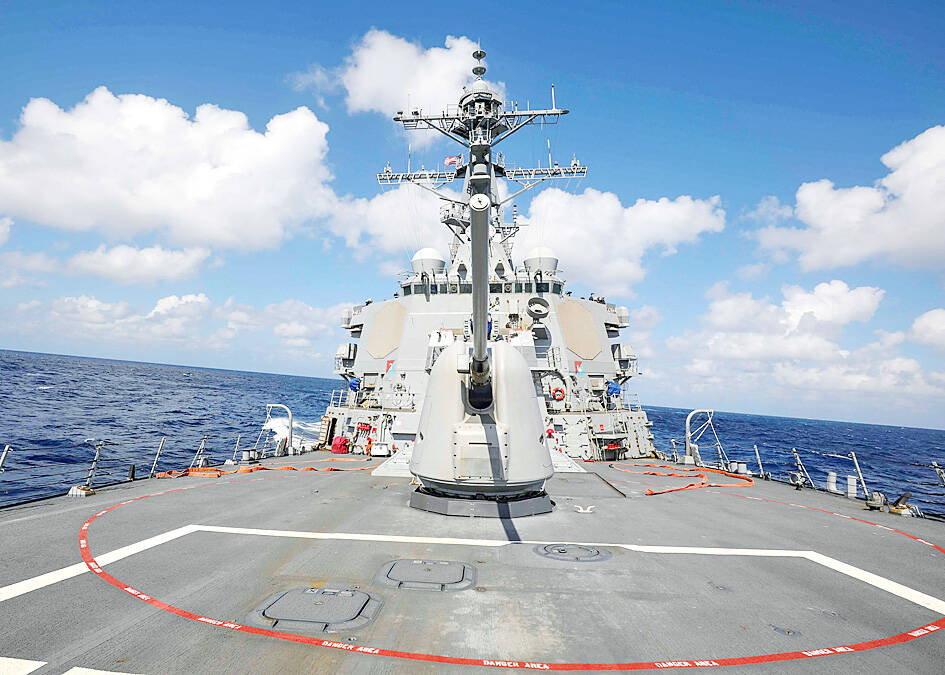The US has begun taking concrete naval action to deter Chinese aggression against Taiwan, bolstering joint defense in the Indo-Pacific region, Institute for National Defense and Security Research research fellow Su Tzu-yu (蘇紫雲) said on Saturday.
Su made the comment in response to US Admiral Stephen Koehler’s statement that the US Pacific Fleet’s mission to deter aggression in the South China Sea encompasses Taiwan.
Koehler, the commander of the fleet, was speaking at the 15th annual Center for Strategic and International Studies’ South China Sea Conference in Hawaii on Tuesday last week.

Photo: Reuters
The US Department of Defense in March said that deterring Chinese aggression against Taiwan was a top priority, Su said.
Koehler’s statement signifies that the US has advanced from policy and strategy to combat planning, establishing concrete military directives, he said.
US forces stationed in South Korea have indicated they would intervene in the event of a situation in the Taiwan Strait, further confirming that Taiwan is a part of the US’ military mission, he added.
This is a series of coordinated measures to gradually deter aggression and assist in the defense of Taiwan, Su said.
Although US President Donald Trump is outwardly friendly to the leaders of China, Russia and North Korea, he relies on the US Department of Defense and the US Department of State to bolster Washington’s commitment to defending Taiwan, he said, adding that it showed that US strategy has shifted toward concrete deterrence.
The US’ actions also align with Japan’s “single theater” concept, which views the four major conflict points in East Asia as one major challenge to encourage allied nations to respond together, Su said.
Taiwan is central to this concept, because its fall into the hands of China would be a fatal breach in the entire defense of the Indo-Pacific region, he said.
“Taiwan is too important,” not just due to Taiwan Semiconducting Manufacturing Co (台積電) and democratic values, but because of its strategic location, he added.
More than 50 percent of global shipping passes close to Taiwan, so a disruption would affect global balance, Su said.
This is why British and Japanese military vessels have passed through the Taiwan Strait three times recently, showing their support for Taiwan, he said.
Reacting to British patrol ships and Koehler’s statement, China has deployed more than 70 military aircraft to the Taiwan Strait, displaying anger at other countries protecting Taiwan, Su said.
The British navy’s HMS Prince of Wales would arrive in the Indo-Pacific region at the end of this month and might pass through the Taiwan Strait to defend the right to freedom of navigation, he said.
Taiwan should make its tracking of Chinese warships public, as China’s Shandong and Liaoning aircraft carriers have been active in the East China Sea and Western Pacific recently, Su said.
This would increase public confidence by making national defense more transparent, and help allied nations work together to deter Chinese aggression, he added.

The manufacture of the remaining 28 M1A2T Abrams tanks Taiwan purchased from the US has recently been completed, and they are expected to be delivered within the next one to two months, a source said yesterday. The Ministry of National Defense is arranging cargo ships to transport the tanks to Taiwan as soon as possible, said the source, who is familiar with the matter. The estimated arrival time ranges from late this month to early next month, the source said. The 28 Abrams tanks make up the third and final batch of a total of 108 tanks, valued at about NT$40.5 billion

Two Taiwanese prosecutors were questioned by Chinese security personnel at their hotel during a trip to China’s Henan Province this month, the Mainland Affairs Council (MAC) said yesterday. The officers had personal information on the prosecutors, including “when they were assigned to their posts, their work locations and job titles,” MAC Deputy Minister and spokesman Liang Wen-chieh (梁文傑) said. On top of asking about their agencies and positions, the officers also questioned the prosecutors about the Cross-Strait Joint Crime-Fighting and Judicial Mutual Assistance Agreement, a pact that serves as the framework for Taiwan-China cooperation on combating crime and providing judicial assistance, Liang

A group from the Taiwanese Designers in Australia association yesterday represented Taiwan at the Midsumma Pride March in Melbourne. The march, held in the St. Kilda suburb, is the city’s largest LGBTQIA+ parade and the flagship event of the annual Midsumma Festival. It attracted more than 45,000 spectators who supported the 400 groups and 10,000 marchers that participated this year, the association said. Taiwanese Designers said they organized a team to march for Taiwan this year, joining politicians, government agencies, professionals and community organizations in showing support for LGBTQIA+ people and diverse communities. As the first country in Asia to legalize same-sex

MOTIVES QUESTIONED The PLA considers Xi’s policies toward Taiwan to be driven by personal considerations rather than military assessment, the Epoch Times reports Chinese President Xi Jinping’s (習近平) latest purge of the Chinese People’s Liberation Army (PLA) leadership might have been prompted by the military’s opposition to plans of invading Taiwan, the Epoch Times said. The Chinese military opposes waging war against Taiwan by a large consensus, putting it at odds with Xi’s vision, the Falun Gong-affiliated daily said in a report on Thursday, citing anonymous sources with insight into the PLA’s inner workings. The opposition is not the opinion of a few generals, but a widely shared view among the PLA cadre, the Epoch Times cited them as saying. “Chinese forces know full well that